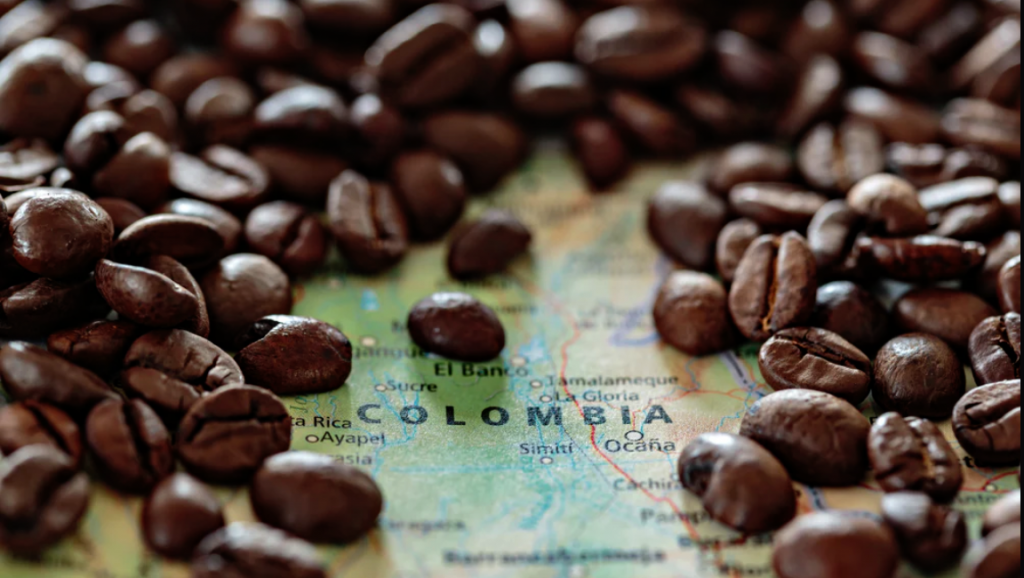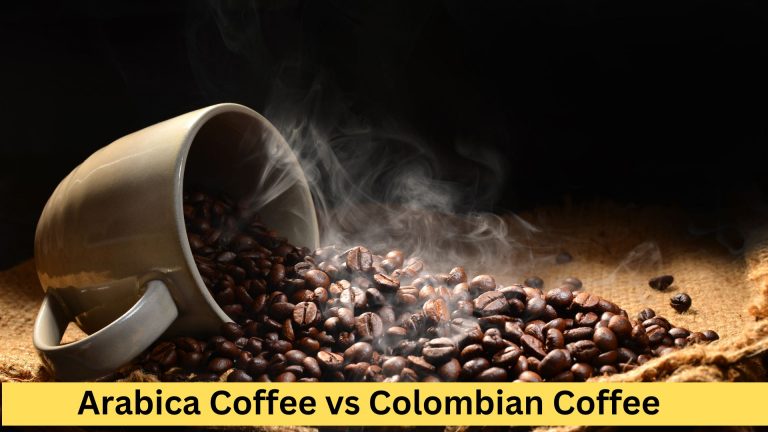Arabica Coffee vs. Colombian Coffee? If you’re a coffee lover, you’ve probably heard of Arabica and Colombian coffee. But what exactly sets them apart? While they may sound similar, there are distinct differences in their flavor, growing conditions, and even how they’re processed.
If you’re wondering which one is right for you, don’t worry—we’ve got you covered! In this guide, we’ll break down the key differences in a simple, easy-to-understand way.
Understanding Arabica Coffee

Arabica coffee is the most popular type of coffee worldwide. About 60-70% of the world’s coffee comes from Arabica beans. But what makes it so special?
Also Read: Does Fresca Have Caffeine?
Where Does Arabica Coffee Come From?
Arabica coffee plants grow best in high altitudes with cool temperatures and plenty of rainfall. These beans are mostly grown in countries like:
- Brazil (the world’s largest producer of Arabica coffee)
- Ethiopia (the birthplace of coffee)
- Colombia
- Guatemala
Also Read: Does Milk Tea Have Caffeine?
Flavor Profile of Arabica Coffee
Arabica coffee is known for its smoother, sweeter taste compared to other coffee types. Depending on where it’s grown, it can have notes of:
- Fruity and floral flavors
- Chocolate and nutty undertones
- Mild acidity with a pleasant aroma
Arabica beans tend to have less bitterness than other types of coffee, making them a favorite among coffee enthusiasts.
Also Read : Does Sweet Tea Have Caffeine?
Pros and Cons of Arabica Coffee
Pros:
- Better taste and smoother flavor
- Lower bitterness
- High-quality beans
Cons:
- More expensive than other coffee types
- More delicate and harder to grow
Also Read : Does Fanta Have Caffeine?
What is Colombian Coffee?

Now, here’s where it gets a little tricky. Colombian coffee isn’t a different species of coffee—it’s actually a type of Arabica coffee grown specifically in Colombia!
Colombian coffee is famous for its high-quality beans and distinct flavor. Thanks to the country’s perfect growing conditions, Colombian farmers produce some of the best Arabica beans in the world.
Also Read: Does Chamomile Tea Have Caffeine?
Why Does Colombian Coffee Stand Out?
Colombia’s climate plays a big role in its coffee’s quality. The country has:
- Rich volcanic soil, which adds nutrients to the plants
- High altitudes, allowing the beans to develop more flavor
- Hand-picked harvesting methods to ensure only the best beans are selected
This means Colombian coffee is consistently high quality and packed with flavor!
Flavor Profile of Colombian Coffee
Because Colombian coffee is a type of Arabica coffee, it shares some similarities in taste. However, Colombian coffee is often described as:
- Well-balanced with a mild sweetness
- Medium-bodied with bright acidity
- Featuring citrus, caramel, and nutty notes
Its smooth texture and vibrant flavor make it incredibly popular worldwide.
Also Read : Does Baja Blast Have Caffeine?
Pros and Cons of Colombian Coffee
Pros:
- High-quality, hand-picked beans
- Balanced flavor with natural sweetness
- Easy to drink (not too strong or bitter)
Cons:
- Slightly more expensive due to labor-intensive harvesting
- Not as strong or bold as some coffee drinkers prefer
Also Read: Does Coffee Liqueur Have Caffeine?
Arabica vs. Colombian Coffee: The Key Differences
While both Arabica and Colombian coffee come from the same family of beans, a few key factors set them apart:
1. Growing Regions
Arabica coffee is grown in many countries around the world, while Colombian coffee comes exclusively from Colombia. The soil, altitude, and climate in Colombia give its coffee a unique flavor compared to Arabica beans grown elsewhere.
2. Flavor & Acidity
- Arabica coffee can have a wide range of flavors depending on where it’s grown. Some beans taste fruity and floral, while others have chocolate and nutty notes.
- Colombian coffee is known for its smooth, well-balanced taste, often with citrus and caramel-like sweetness.
- Colombian coffee tends to have slightly more acidity, which gives it a bright, lively taste.
3. Processing Methods
One major difference is in the processing method. Colombian coffee is often wet-processed (washed), which helps bring out a cleaner, fruitier flavor. Some Arabica beans from other countries may be processed differently, impacting their taste.
4. Price & Quality
Colombian coffee is often more expensive than standard Arabica coffee because it’s hand-picked for quality. However, both can be found in a variety of price ranges.
Also Read: Does Cacao Have Caffeine?
Which One Should You Choose?
Still not sure which one to pick? It depends on your personal taste preferences!
Go for Arabica coffee if you:
- Want a wide variety of flavors to choose from
- Prefer a milder, less acidic cup
- Are okay with variations in quality
Choose Colombian coffee if you:
- Enjoy a bright, balanced flavor with mild acidity
- Want consistently high-quality beans
- Prefer a smooth, easy-to-drink coffee
At the end of the day, both Arabica and Colombian coffee offer incredible flavors. If you love exploring different coffee profiles, why not try both? You might just find a new favorite!
Also Read: Does Blonde Espresso Have More Caffeine?
Videos About Arabica Coffee vs Colombian Coffee?
Final Thoughts: The Winner?
There’s no clear “winner” between Arabica and Colombian coffee—it all comes down to what suits your taste buds. If you want variety, Arabica coffee has endless options. But if you want a reliably smooth and high-quality coffee, Colombian coffee is a great pick.
No matter which one you choose, you’re in for a delicious cup of coffee. Now, grab your favorite beans, brew a fresh pot, and enjoy the rich, aromatic world of coffee!
What’s your go-to coffee choice? Let us know in the comments below! ☕✨

